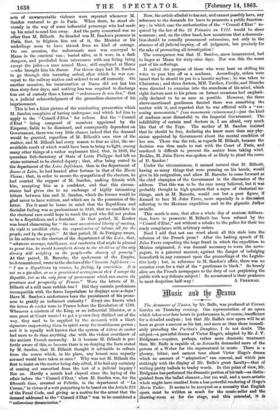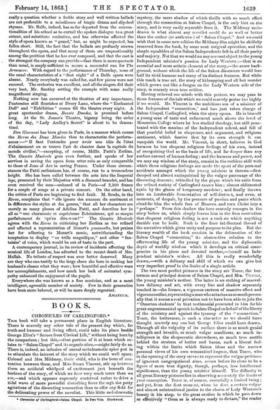1 uft ad. Ike prama
The Armourer of Nantes, by Mr. Balfe, was produced at Covent Garden on Thursday evening. One representation of an opera which takes over four hours in performance is, of course, insufficient for a detailed analysis ; but that Mr. Balfe's new opera will be at least as great a success as his last, and more so than those immedi- ately preceding the Puritan's Daughter, I do not doubt. The subject—a powerful drama of Victor Hugo's, adapted by Mr. J. V. Bridgman—requires, perhaps, rather more dramatic treatment than Mr. Balfe is capable of, as Satanella demanded more of the powers of a Weber for the supernatural in music. There is a gloomy, bitter, and earnest tone about Victor Hugo's drama which no amount of "adaptation" can conceal, and which jars strikingly with the display of Mr. Balfe's great faculty—that of writing pretty ballads to trashy words. In this point of view, Mr. Bridgman has performed the dramatic portion of his task-4a distin- guished from the ballad element—but too well, and a more artistic whole might have resulted from a less powerful rendering of Hugo's Marie Tudor. It seems to be accepted as a necessity that English opera must be written as much for the music-seller and the drawing-room as for the stage, and this conceded, it is
really a question whether a feeble story and well written ballads are not preferable to a mesalliance of tragic drama and slipshod rhymes. Mr. Balfe, indeed, has so far departed from the conven- tionalities of his school as to curtail the spoken dialogue to a great extent, and substitute recitative, and has otherwise affected the style of opera known as "grand," but, as might be expected, has fallen short. Still, the fact that the ballads are profusely strewn throughout the opera, and that many of them are unquestionably among the prettiest thet he has ever composed, and that the cast is , the strongest the company can provide—that there is more spectacle than usual, is amply sufficient to secure a successful run for The Armourer. With regard to the performance of Thursday, none of the usual characteristics of a "first night" of a Balfe opera were absent. Nearly everybody was called for, and few pieces were not encored. The orchestra was excellent, and all the singers did their very best, Mr. Santley setting the example with some really magnificent singing.
Nothing new has occurred at the theatres of any importance. Pantomine still flourishes at Drury Lane, where the "Enchanted Dell" and "Exhibition" scenes fill the theatre every night. A great spectacular drama, Bonnie Dundee, is promised before long. At the St. James's Theatre, bigamy being the order of the day, "Lady Audley's Secret" is about to be drama- tized.
Don Giovanni has been given in Paris, in a manner which causes the Revue des Deux Mondes thus to characterize the perform- ances :—" Ii faut reutendre pour avoir une idee de l'etat d'abaissement ou se trouve Part de chanter dans la capitale du monde civilise,"—excepting, of course, Mdlle. Patti's Zerlina. The Gazette Musicale goes even further, and speaks of her services in saving the opera from utter ruin as only comparable to those of Joan of Arc in saving France. Under these circum- stances the Patti enthusiasm has, of course, run to a tremendous height. She has been called between the acts into the Imperial loge, presented by their Majesties with a diamond bracelet, and has even received the sum—unheard of in Paris—of 2,500 francs for a Couple of songs at a private concert. On the other hand, the critics of Paris are beginning to find fault. M. Scudo, in the Revue, complains that " elle ignore des nuances du sentiment et la dilference des styles et des genres," that all her characters are merely So many phases of Adelina Patti, and describes her in all as "une charmante et capricieuse BohOmienne, qui se moque parfaitement de ‘qu'en dira-t-on?" The Gazette Musicale agrees With the Revue in criticizing her Zerlina as too refined and affected a representation of Mozart's paesanella, but praises her for adhering to Mozart's music, notwithstanding the temptation to display "cc trille magnifique," and other " fan- taisies" of voice, which would be out of taste in the part.
A contemporary journal, in its review of incidents affecting the musical life of London, has adverted to the recent death of Mrs. Hullah. No tribute of respect was ever better deserved. Many are they who can testify to the large share she bore in making her husband's classes what they were ; how beautiful and effective were her accomplishments, and how much her look of animated sym- pathy enhanced the enjoyment of the pupils.
Everywhere she was known as a fine musician, and as a most intelligent, agreeable member of society. Few in their generation have been more beloved, or will be more deeply regretted.
AMATEUR,































 Previous page
Previous page